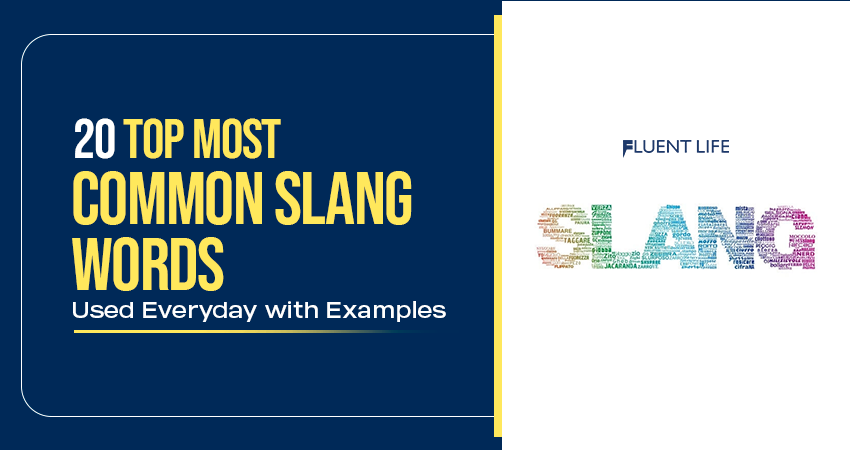In the complex fabric of English, slang terms stand out as vivid threads that weave through our daily discussions. This article explores the most common slang words used everyday, revealing their definitions, complete forms, and cultural subtleties.
What are Slang Words?
Slang words are the informal and unconventional expressions that color our conversations. They are the words that add a touch of personality to our language, reflecting the dynamic nature of communication in different social circles. Understanding slang is like unlocking a secret code to more nuanced and authentic dialogue.
Understanding and Learning Common Slang Words Used Everyday
The significance of understanding and learning English slang words goes beyond casual banter. It’s a key aspect of cultural literacy, allowing individuals to connect on a deeper level and navigate the informal terrain of modern communication. Proficiency in slang enhances the richness of language and fosters a sense of belonging.
Top 20 Common Slang Words Used Everyday:
Top 20 Common Slang Words Used Everyday
|
| Lit |
Savage |
YOLO |
Turnt |
| Bae |
Gucci |
Swag |
Goals |
| Fam |
Litty |
Thirsty |
Ghost |
| Flex |
FOMO |
Chill |
Noob |
| Salty |
Squad |
Basic |
Vibes |
Common Slang Words Used Everyday: Full Form, Meaning & Examples
1. Lit: Commonly Used English Slang Word
| Lit: Commonly Used English Slang Word |
| Full Form: |
No specific full form |
| Definition: |
Exceptionally exciting or cool |
| Meaning: |
A state of heightened excitement or enjoyment. |
| Category: |
Adjective (Exciting) |
| Examples: |
- The party last night was so lit; everyone had a great time.
- His new song is lit, climbing the charts rapidly.
- A lit movie night with friends is all I need on weekends.
|
2. Bae: Commonly Used English Slang Word
| Bae: Commonly Used English Slang Word |
| Full Form: |
Before Anyone Else |
| Definition: |
Term of endearment for a significant other |
| Meaning: |
Someone incredibly important and cherished. |
| Category: |
Noun (Significant Other) |
| Examples: |
- Date night with bae is always special.
- I can’t wait to see my bae after a long day.
- She’s not just a friend; she’s my bae.
|
3. Fam: Commonly Used English Slang Word
| Fam: Commonly Used English Slang Word |
| Full Form: |
Family |
| Definition: |
A term used to refer to close friends or a group |
| Meaning: |
A chosen group of people is considered like family. |
| Category: |
Noun (Close Friends) |
| Examples: |
- Sunday dinners with the fam are a tradition.
- Fam always supports me in everything I do.
- Movie night with the fam is the best part of the week.
|
4. Flex: Commonly Used English Slang Word
| Flex: Commonly Used English Slang Word |
| Full Form: |
Display of strength or capability |
| Definition: |
To show off or boast |
| Meaning: |
Demonstrating one’s abilities or possessions proudly. |
| Category: |
Verb (Show Off) |
| Examples: |
- He likes to flex his muscles after a workout.
- Don’t flex about your achievements; be humble.
- She can flex her language skills in any situation.
|
5. Salty: Common Slang Words Used Everyday
| Salty: Commonly Used English Slang Word |
| Full Form: |
No specific full form |
| Definition: |
Irritated, upset, or bitter |
| Meaning: |
Expressing frustration or annoyance. |
| Category: |
Adjective (Irritated) |
| Examples: |
- He gets salty when things don’t go his way.
- Don’t be salty about constructive criticism.
- She’s a bit salty after losing the game.
|
6. Savage: Commonly Used English Slang Word
| Savage: Commonly Used English Slang Word |
| Full Form: |
Fierce or ferocious |
| Definition: |
Fearless, brutal, or unapologetic |
| Meaning: |
Someone bold, audacious, or fierce. |
| Category: |
Adjective (Fearless) |
| Examples: |
- She made a savage comeback during the argument.
- Being savage is necessary in certain situations.
- A savage sense of humor is always appreciated.
|
7. Gucci: Commonly Used English Slang Word
| Gucci: Commonly Used English Slang Word |
| Full Form: |
Good, cool, or fine |
| Definition: |
Everything is going well |
| Meaning: |
A positive affirmation. |
| Category: |
Adjective (Good) |
| Examples: |
- Everything is Gucci; no need to worry.
- Feeling Gucci about the upcoming project.
- His new car is so Gucci.
|
8. Litty: Commonly Used English Slang Word
| Litty: Commonly Used English Slang Word |
| Full Form: |
Combination of lit and pretty |
| Definition: |
Extremely exciting and attractive |
| Meaning: |
Something that is both exciting and aesthetically pleasing. |
| Category: |
Adjective (Exciting and Pretty) |
| Examples: |
- The club was litty; the music was on point.
- Her outfit was litty; everyone noticed it.
- Making any event litty is all about the energy.
|
9. FOMO: Commonly Used English Slang Word
| FOMO: Commonly Used English Slang Word |
| Full Form: |
Fear of Missing Out |
| Definition: |
Anxiety about missing out on social events |
| Meaning: |
The fear that others are having enjoyable experiences without you. |
| Category: |
Acronym (Fear of Missing Out) |
| Examples: |
- Don’t let FOMO dictate your choices.
- Experiencing FOMO when seeing friends’ posts.
- Overcoming FOMO by focusing on personal priorities.
|
10. Squad: Common Slang Words Used Everyday
| Squad: Commonly Used English Slang Word |
| Full Form: |
A group of friends |
| Definition: |
Close-knit social circle |
| Meaning: |
A tight group of friends who support each other. |
| Category: |
Noun (Group of Friends) |
| Examples: |
- Going out with the squad tonight.
- My squad always has my back.
- Squad goals: always supporting each other.
|
11. YOLO: Commonly Used English Slang Word
| YOLO: Commonly Used English Slang Word |
| Full Form: |
You Only Live Once |
| Definition: |
Embracing life’s opportunities without fear |
| Meaning: |
Encouragement to live life to the fullest. |
| Category: |
Acronym (You Only Live Once) |
| Examples: |
- Decided to try skydiving because of YOLO.
- Booked a spontaneous trip because, well, YOLO.
- Taking risks and trying new things, YOLO mentality.
|
12. Swag: Commonly Used English Slang Word
| Swag: Commonly Used English Slang Word |
| Full Form: |
Bold self-confidence and style |
| Definition: |
A distinctive and stylish way of carrying oneself |
| Meaning: |
Displaying confidence and a unique sense of style. |
| Category: |
Noun (Style and Confidence) |
| Examples: |
- He walked in with so much swag.
- Her outfit has serious swag.
- Confidence is the key to swag.
|
13. Thirsty: Commonly Used English Slang Word
| Thirsty: Commonly Used English Slang Word |
| Full Form: |
Seeking attention excessively |
| Definition: |
Desperate or overly eager |
| Meaning: |
Acting overly eager for approval or attention. |
| Category: |
Adjective (Desperate) |
| Examples: |
- He’s acting so thirsty for attention.
- Don’t be too thirsty; play it cool.
- Thirsty comments won’t get you far.
|
14. Chill: Commonly Used English Slang Word
| Chill: Commonly Used English Slang Word |
| Full Form: |
Relaxed or easygoing |
| Definition: |
Calm and laid-back |
| Meaning: |
Maintaining a relaxed attitude. |
| Category: |
Adjective (Relaxed) |
| Examples: |
- Let’s have a chill weekend at the beach.
- He’s such a chill person; always easy to talk to.
- The atmosphere at the park was chill and relaxing.
|
15. Basic: Common Slang Words Used Everyday
| Basic: Commonly Used English Slang Word |
| Full Form: |
Common or unoriginal |
| Definition: |
Lacking individuality or uniqueness |
| Meaning: |
Someone or something ordinary or mainstream. |
| Category: |
Adjective (Common) |
| Examples: |
- Her taste is so basic; that she follows trends blindly.
- Choosing something basic isn’t always a bad thing.
- Being basic means embracing simplicity.
|
16. Turnt: Commonly Used English Slang Word
| Turnt: Commonly Used English Slang Word |
| Full Form: |
Excited and energetic |
| Definition: |
Extremely hyped or intoxicated |
| Meaning: |
Being in a state of heightened excitement or energy. |
| Category: |
Adjective (Excited and Energetic) |
| Examples: |
- The crowd was turnt at the concert; everyone was dancing.
- Getting turnt at a party is the best way to have fun.
- His energy was turnt up during the game; he played exceptionally well.
|
17. Goals: Commonly Used English Slang Word
| Goals: Commonly Used English Slang Word |
| Full Form: |
Aspiring to achieve something |
| Definition: |
Something desirable or admirable |
| Meaning: |
Expressing admiration for someone’s qualities or achievements. |
| Category: |
Noun (Aspiring to Achieve Something) |
| Examples: |
- Your outfit is a goals; I want to dress like that.
- Their relationship is goals; they’re so supportive of each other.
- Getting fit is one of my goals for this year.
|
18. Ghost: Commonly Used English Slang Word
| Ghost: Commonly Used English Slang Word |
| Full Form: |
Abruptly disappearing from communication |
| Definition: |
To suddenly stop responding or being present |
| Meaning: |
Ending communication without explanation. |
| Category: |
Verb (Abruptly Disappearing from Communication) |
| Examples: |
- After the argument, he decided to ghost her.
- Ghosting is not a mature way to end a relationship.
- Being ghosted can be hurtful and confusing.
|
19. Noob: Commonly Used English Slang Word
| Noob: Commonly Used English Slang Word |
| Full Form: |
Newcomer or novice |
| Definition: |
Someone inexperienced or unfamiliar with something |
| Meaning: |
Referring to someone new to a particular activity. |
| Category: |
Noun (Newcomer or Novice) |
| Examples: |
- Don’t be too hard on him; he’s still a noob in this game.
- Every expert was once a noob; it’s part of the learning process.
- Being a noob is nothing to be ashamed of; we all start somewhere.
|
20. Vibes: Common Slang Words Used Everyday
| Vibes: Commonly Used English Slang Word |
| Full Form: |
Atmosphere or energy |
| Definition: |
The overall feeling or mood of a situation |
| Meaning: |
Refers to the general atmosphere or energy. |
| Category: |
Noun (Atmosphere or Energy) |
| Examples: |
- The vibes at the party were amazing; everyone was having a good time.
- I’m getting positive vibes from this project; it’s going to be successful.
- Surround yourself with good vibes; it makes a significant difference in your mood.
|
In our English Fluency Course, we delve into the dynamic world of modern slang, providing you with the linguistic tools you need to handle informal conversations confidently. From “lit” to “yeet,” ‘The Fluent Life‘ delves into the changing terrain of informal language, assisting you in understanding the intricacies of expression in everyday encounters. You’ll learn how to easily blend expressions like “on fleek” and “bae” into your vocabulary, improving your fluency and cultural awareness. With our fascinating classes, you’ll not only learn slang terms but also acquire confidence in your ability to converse smoothly in any English-speaking environment.
Conclusion: Common Slang Words Used Everyday
Understanding and integrating these slang words into your vocabulary adds flair to your expressions and fosters a stronger connection with contemporary language trends. From lit parties to YOLO moments, embracing these terms enriches your communication skills and keeps you in the loop of modern colloquialism.
Five Important FAQs
Q.1: Why is slang important in everyday communication?
A: Slang adds a layer of informality and authenticity to conversations, allowing for more nuanced and expressive communication.
Q.2: How can I learn and use slang appropriately?
A: Pay attention to how native speakers use slang in context and gradually incorporate it into your speech and writing.
Q.3: Are slang words the same across different English-speaking regions?
A: While some slang words are universal, many are region-specific. Stay open to learning new terms when interacting with people from different areas.
Q.4: Can using slang be considered unprofessional in certain situations?
A: Yes, in formal or professional settings, it’s essential to gauge the appropriateness of using slang. When in doubt, opt for more conventional language.
Q.5: Do slang words have a short lifespan?
A: Some slang words come and go quickly, while others become ingrained in everyday language. Staying updated on current trends helps in using relevant slang.
Also Read: Top 100 Commonly Used A to Z Phrasal Verbs for English Fluency






